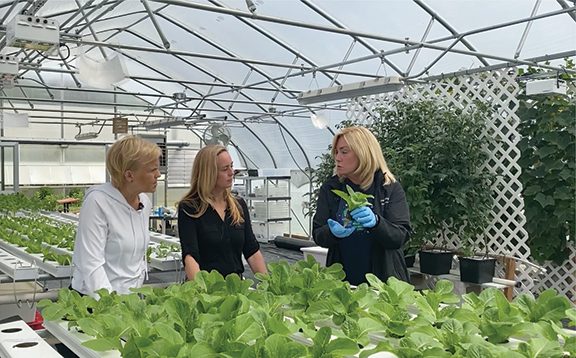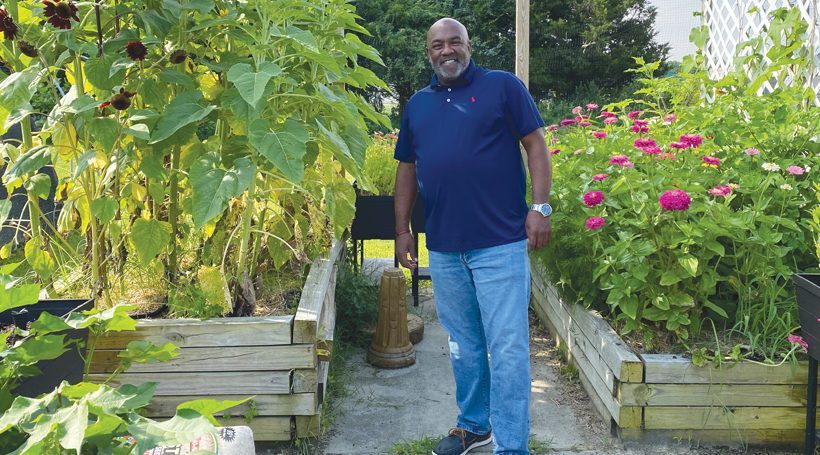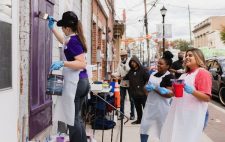Commissioner Jonathan Young at the Camden County Sustainability Campus
We’ll let you in on a secret – if you live in Camden County, you already have a garden. And a greenhouse. And a vineyard. And a shed full of tools. And no, we don’t mean at your house.
Camden County’s Sustainability Campus is a 10-acre park, learning center and community resource in Blackwood. With programs ranging from gardening to tool lending, bike shares, open spaces and more, the idea is to make sustainability as easy and accessible to as many people as possible. And it all started with just 1 greenhouse.
“A decade ago, there was just 1 employee in the County Sustainability office, wandering the halls of City Hall thinking up ways to be more environmentally friendly,” says Camden County Commissioner Jonathan Young, who serves as a liaison to the county’s Sustainability Office (the only government office in the state focused entirely on sustainability). “As we saw more problems and dreamed up more solutions, that team grew, the mission grew, and we needed a place to put it.”
One of its first and most prominent programs is the Certified Gardeners program, where residents sign up for a training course in all things gardening and use that knowledge to benefit the community. There are currently more than 135 volunteers working in the gardens, and part of their goal is to share what they know. (All you have to do is call 856-216-7130 to reach them.)
“You can see aspects of the sustainability campus all around if you know where to look,” says Valerie Brown, program coordinator for the Camden County Office of Sustainability. “Gardeners grow perennials in the campus’ traditional greenhouse, which you’ll see in community parks and at the county’s annual Mother’s Day flower sale.”
And they don’t just look pretty – the department works in partnership with the CCMUA (Camden County Municipal Utilities Authority) to create rain gardens, which help capture rainfall and protect the city’s infrastructure.
“So we’re alleviating the stress and the load on the pipes and reducing the flooding issues,” she says.
In the hydroponic greenhouse, where plants grow in a nutrient solution instead of soil, gardeners grow fruits and vegetables without pesticides and use only 10% of the water required in traditional farming methods. That produce is then donated to Cathedral Kitchen, neighborhood centers and senior centers, or it’s sold. Local bit of trivia: That lettuce the giraffes are eating at the Philadelphia Zoo? That was grown in the campus’ hydroponic gardens.
“In the wintertime and offseason, giraffes and tortoises and other vegetarians have a hard time getting the fresh fruits and vegetables they need, so we grow it for them,” says Young.
You may even find produce from the campus in your wine. The department has a 1-acre winery on site that not only helps supplement grapes for local wineries when they run out of their own harvest, but also teaches wine-making and vineyards as a business through a partnership with Camden County College. The campus’ vineyard is now in its 2nd harvest.
But of course, sustainability is more than just growing produce – it’s making decisions that reduce waste and make environmentally conscious choices easy and accessible to everyone.

SJ Mag’s Marianne Aleardi, Toni Farmer and Valerie Brown, program coordinator for the Camden County Office of Sustainability, discuss hydroponics at the sustainability campus
“Our goal is for residents to walk through our facility and see different sustainable practices they can take home and do themselves,” says Brown.
Because sustainability isn’t always cheap, the key, she says, is making sure anyone can make sustainability decisions, regardless of where they live or how much money they have. So the county came up with a 2-fold solution: reduce waste in the landfills by repurposing items people might otherwise throw away.
The campus’ bike share program has volunteers fix bikes donated from members of the community or that remain unclaimed from local police stations. The repaired bikes are then available to rent. The same goes for tools. With the tool-sharing library, instead of buying new tools for every project, residents can check out what they need from a large supply donated to the campus and refurbished by volunteers. They have everything from rakes to hedge clippers, lawn mowers, leaf blowers, and even single-use items like screws, nuts and bolts.
“Think about the single mother who wants to start a garden or who can’t afford to call professionals to fix something at home,” says Young. “She can come down here and get enough tools to remodel the house all because, when people cleaned out their garages in the spring, they brought these items here instead of sending it to the landfill.”
And they’re seeing the effects across the county.
“We’re seeing energy and gas bills go down, less flooding and fewer loads of recycling being turned away from the centers,” says Young. “Especially when this first started, when you sell ‘sustainability’ you’re selling a vision of the future. These solutions are something the entire county got on board with, because they knew it was important. We’re seeing the benefits now.”
The campus is also simply somewhere for people to enjoy their time outside. Families will be able to enjoy the grounds, walk the 1-mile pathway, stand in the small bamboo forest or explore a sensory garden designed for people with Autism Spectrum Disorder.
Plus, there are more projects in the works. The center is about to open a commercial-grade kitchen, which people can rent to bake food to sell – a much-needed resource for people looking to start a small business. They’re also working on adding more greenhouses, establishing a seed-saving library and even creating a lending library so you don’t have to use dozens of single-use plates every time you throw a party.
“Our goal is to educate, to be a leader and to show by example,” says Brown. “It’s not just acknowledging that there’s a problem. It’s a constant evolution in trying to be a part of a solution for the future.”














